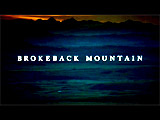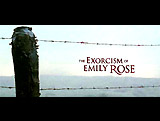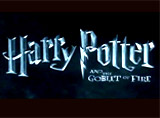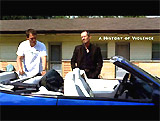
|
![]()
Greatest Films of the 2000s
2000 | 2001 | 2002 | 2003 | 2004 | 2005 | 2006 | 2007 | 2008 | 2009
Title Screen Film Genre(s), Title, Year, (Country), Length, Director, Description 


Æon Flux (2005), 93 minutes, D: Karyn Kusama
This high-action, futuristic sci-fi thriller was set in the walled, fictional city-state and utopian haven of Bregna, a post-apocalyptic society in the year 2415. A small number of inhabitants were forced to live under the rule of the totalitarian Goodchild dynasty of genetic scientists. A devastating lethal virus in 2011 had killed 99% of the population (leaving only 5 million people) and had caused everyone else who survived to become sterile. Mysterious assassin-rebel and trained freedom fighter Aeon Flux (Charlize Theron) worked for a group of underground, anti-government rebels (led by the Handler (Frances McDormand)) known as Monicans. Aeon Flux was assigned by the Handler to sabotage the Goodchild regime's central surveillance facility, defeat the regime, and eliminate its mastermind scientist and Chairman Trevor Goodchild (Marton Csokas), who had descended from the man who found a cure for the virus. After the murder by government agents of Aeon's sister Una (Amelia Warner) who was found to be pregnant, Aeon disobeyed orders to kill Trevor and decided to protect him. He revealed deep secrets to her about the past - decades earlier while researching a cure, the original population had been cloned over seven generations, to ensure a population. Since everyone in Bregna was a clone grown from recycled DNA, many of the descendants of the original population were now unexplainedly disappearing, and/or experiencing troubling and destablizing symptoms (loss of sleep, bad dreams, incomplete memories of past lives, etc.). There were efforts being made to reverse the infertility problem. But nature was also beginning to find a way to overcome the sterility issue and women were again becoming pregnant naturally. In a subplot regarding a conspiracy, Trevor's evil younger brother Oren Goodchild (Jonny Lee Miller) was scheming to stage a coup - he wanted to destroy Trevor's experimental lab work and research to find a cure for sterility (and repopulate the city). Oren was also the one responsible for the murder of Una. His plan was to kill the clones which were now reproducing, to maintain the power and continuity of the Goodchild dynasty. Oren also wanted to kill Aeon by destroying her DNA. In the finale, Aeon went against both Oren and her former allies by killing Oren. On a mission to destroy the Relical, a giant blimp/dirigible that circled above the city (and housed the main DNA library or storage system used for cloning), Aeon learned from the 400 year old hologramic Keeper (Pete Postlethwaite) inside the blimp that she was the clone of Trevor's wife from 400 years earlier, and was named "Katherine." Years ago, the Keeper had rescued her, and had preserved and hidden her DNA, although Oren had ordered it to be destroyed. Oren hadn't wanted "Katherine" to influence Trevor. The Keeper had now brought her back - since the time was right - to "reach Trevor" - to show him that his "perfect" world wasn't so perfect. The Keeper was now ready to die since his mission was completed. Aeon Flux destroyed the "Relical" by planting explosives inside it - and as it descended, it crashed into the outer wall of Bregna and exposed the population to the outside, lushly-green jungle world, thought to be a wasteland. "Katherine" was reunited with Trevor - they joined hands: "Now we can move forward, to live once for real, and then give way to people who might do it better." The last scene was 400 years earlier, when Katherine and Trevor, girlfriend and boyfriend, spoke to each other on a street: "Hey, Katherine. Will I see you again?" She smiled back, and the voice-over concluded that now, everyone had just one life remaining to live - and they were free to choose their own destiny: "To live only once - but with hope."






Batman Begins (2005), 140 minutes, D: Christopher Nolan
This film was a reboot of the Caped Crusader franchise-series, following the failure of the two previous films: Batman Forever (1995) and Batman & Robin (1997) and an 8-year gap. It was the first film in a so-called "Dark Knight Trilogy" of darker more violent films from 2005-2012 - see Batman franchise-series. The superhero action-thriller crime drama (told with criss-crossing flashbacks) opened with the origin story of young Bruce Wayne (Gus Lewis as youth) - born into wealth and his father's business Wayne Enterprises. In crime-ridden Gotham City, 8 year-old Wayne watched as his parents Dr. Thomas (Linus Roache) and Martha (Sara Stewart) were mugged and killed by street criminal Joe Chill (Richard Brake) in an alleyway when they left an opera performance early. Orphaned Bruce was then raised by the family's butler Alfred Pennyworth (Michael Caine). Traumatized by his parents' deaths and his own phobic fear of bats, 14 years later, vengeful billionaire playboy Bruce (Christian Bale as adult) was intent on vigilante justice by murdering paroled Joe Chill, who was to be released if he testified against his cellmate, gang and drug boss Carmine "The Roman" Falcone (Tom Wilkinson). But before Bruce could act, a blonde female reporter-assassin (Catherine Porter) lethally shot Chill. He was encouraged to search for answers by his childhood friend and romantic sweetheart Rachel Dawes (Katie Holmes), the city's Assistant DA who believed in true justice, not revenge. For the next 7 years, Bruce relocated to Asia where he was mentored by Henri Ducard (Liam Neeson). He was invited to be trained in martial arts and joined to a mysterious group of vigilantes and assassins known as the League of Shadows. He also met with Ra's al Ghul (Ken Watanabe), the head of the League (later revealed as a decoy for the real leader). Once Bruce returned to Gotham City years later, he was presumed dead. It was an opportunity for Bruce to fight crime in the Gotham underworld with a new persona - Batman, and to live by day as a philanthropic playboy. He was assisted with his new identity (a masked Bat body-suit and a Batmobile Tumbler) by Alfred and Wayne Enterprises gadgets-maker Lucius Fox (Morgan Freeman). He resided in a Bat-Cave beneath Wayne Manor. His first target was shady psycho-pharmacologist Dr. Jonathan Crane (Cillian Murphy) (aka the insane Scarecrow) at Arkham Asylum, who had plotted with the underworld (and drug smuggler Falcone). His plan was to expose all of Gotham's residents to a smuggled, fear-inducing toxic substance put in the water supply. The Scarcrow also revealed he was working for Ra's al Ghul, whose true leader was Henri Ducard! Ra's al Ghul's more dastardly plan was to vaporize Gotham's water supply with a microwave emitter, sending Crane's drug airborne to destroy the city and cause mass hysteria. He first set Wayne Manor ablaze, where Bruce was revived and rescued by Alfred. And then in an exciting action sequence, Batman fought Ra's al Ghul who was riding in the city's monorail with the emitter bound for Wayne Tower (in the center of Gotham). Their brutal struggle ended with the villain's death in a monumental train crash. Batman was heralded as the city's hero, as he further allied himself with honest police officer Sgt. James Gordon (Gary Oldman) (now promoted to Lieutenant), to continue fighting crime. From now on, Batman would be summoned with a Bat-Signal shining like a searchlight in the night sky, to fight the next evil criminal - the Joker!




Brokeback Mountain (2005), 134 minutes, D: Ang Lee
Best Director-winning Ang Lee's landmark and poignant, forbidden love story (and modern-day western) was about a 20 year relationship (1963-1983) between two married bi-sexual cowboys. The two who fell in love were 19 year-old Wyoming ranch-hand Ennis Del Mar (Best Actor-nominated Heath Ledger) and aspiring rodeo cowboy Jack Twist (Best Supporting Actor-nominated Jake Gyllenhaal). Their first meeting in the summer of 1963 was as innocently-exuberant skinny-dippers in a pond, when the two ranchers worked together as sheep-herders near Brokeback Mountain. Ennis rebuffed Jack's daring attempt to kiss him and to mutually touch each other, but then returned sheepishly with his hat in hand and accepted their first kiss, before their first sexual experience (anal intercourse) together. It was an under-one-minute sexual encounter in a shared sleeping bag in a two-man tent. They seriously struggled in their awkward relationship, and after their summer together, both were married. Ennis wed fragile, waifish Alma Beers (Best Supporting Actress-nominated Michelle Williams) - with two daughters, and Jack tied the knot with tomboyish rodeo queen Lureen Newsome (Anne Hathaway) - with one son. Due to their conflicted feelings, both experienced strained marriages. Four years later in 1967, the two had a reunion in Wyoming. The two hugged each other tightly, as Ennis nervously looked around, then forcefully grabbed Jack and pushed him into a secluded spot by stairs where they kissed hungrily, while Ennis' wife Alma accidentally spied on their embracing passion from above and turned away. However, the two infrequently met for 'fishing' trips - but suspiciously never brought home any of their catch. In 1975, Alma and Ennis divorced, and Alma took custody of the two daughters. Now that Ennis was free, Jack suggested that they retreat to a small ranch to live together, but Ennis rejected the idea of abandoning his family, and facing anger from locals for being "queer." Even so, they continued to meet a few times a year in Wyoming, where Jack would drive to meet up. By 1978, Jack's marriage had also deteriorated, but the two still could not agree to live together. Some time after Jack's death in 1980, the anguished Ennis learned of his passing. Lureen told him that Jack had died while changing a tire that exploded, although Ennis imagined it as a gay-bashing homophobic incident in a field. Jack's parents disagreed with their son's wishes to spread his ashes at Brokeback Mountain. Ennis visited Jack's parents at their home, and discovered blood-stained shirts in Jack's childhood bedroom closet. The shirts belonged to himself and ex-lover Jack from when they fought together years earlier on Brokeback Mountain in 1963. Ennis held the intertwined shirts (Jack's shirt was on the outside) to his face and breathed in their scent. When he left, he took the shirts with him. Broke and lonely, Ennis lived in a trailer, where in 1983, he was visited by his 19-year-old daughter Alma Jr. (Kate Mara), who told him that she was engaged - she invited him to the wedding. In the melodramatic ending, Ennis went to his trailer closet where he again saw their two old shirts (hanging in the back of his closet). The two shirts were both together on one hanger, intertwined but reversed - Jack's blood-stained shirt was now covered by Ennis's. He also saw a postcard of Brokeback Mountain tacked next to the shirts and straightened it - he tearfully and regretfully cried about their forbidden homosexual love affair: ("Jack, I swear...").


Caché (2005, Austria/It./Germ./Fr.) (aka Hidden), 111 minutes, D: Michael Haneke
In this dark and dramatic psychological thriller about repressed childhood guilt, an upper-middle class couple were introduced living in a modern townhouse in Paris: host of a TV literary review show Georges Laurent (Daniel Auteuil) and his publisher wife Anne Laurent (Juliette Binoche), with their 12-year-old son Pierrot (Lester Makedonsky). Without explanation, the family began to receive anonymously-delivered parcels of videotapes, along with morbid, childlike drawings (of a boy's face with blood coming from his mouth, and of a bleeding chicken's neck). The mysterious videos revealed that the family was being surveilled or monitored from the street (day and night). More drawings arrived at Georges's workplace and Pierrot's school. Although interpreted as menacing and intrusive, the French police regarded the items as non-criminal. A third videotape viewed the estate where Georges grew up - pointing to the inescapable conclusion that the images were flashbacks that referred to Georges' haunted childhood memories. He recalled how at the end of France's Algerian War (1954-1962), an Algerian family working as farmhands at his parents' estate had a boy named Majid (Malik Nait Djoudi as child). [Note: The parents were killed during an anti-government demonstration and massacre in 1961, and their bodies were thrown in the Seine River.] As a six-year old, Georges (Hugo Flamigni as youth) had jealously resisted the idea of his parents adopting the orphaned boy by telling lies about him. Georges directed Majid to behead the family's rooster with an axe (and allegedly menaced him too), and soon after, Majid was sent back to the orphanage. Another videotape provided clues that led Georges, during his search for answers, to the street and address (# 049) of the now-grown, 40 year-old Majid (Maurice Bénichou), living alone in Romainville. In a short confrontational scene with him (that left Majid distraught and crying), Georges' conversation with him was again secretly recorded, and the tape was sent to Georges' employer (Bernard Le Coq). Meanwhile, the Laurent's son Pierrot disappeared (and Majid and his son (Walid Afkir) were suspected but innocent), but later, Pierrot reappeared unharmed. After the incident, Georges returned to Majid's apartment. After Majid again denied involvement in the tapes, he suicidally slashed his throat in Georges' presence. Afterwards, Georges suspected Majid's son of being responsible for the tapes. The son replied by asking Georges how he felt about being responsible for Majid's death. In the final scene, Pierrot and Majid's son were speaking together at their high school - were they co-conspirators?

Capote (2005), 115 minutes, D: Bennett Miller
Based upon Gerald Clarke's 1988 biography Capote, this biographical drama followed events surrounding homosexual novelist-author Truman Capote's (Philip Seymour Hoffman) investigative research and authorship of his first non-fictional book In Cold Blood, published in 1966. In November of 1959, multiple cold-blooded murders were committed at the Cutter family's rural Holcomb, KS farmhouse. He ventured to Kansas to the crime scene with his close friend and aspiring writer Harper Lee (Catherine Keener), where he gathered information on the case from Kansas Bureau of Investigation agent Alvin Dewey (Chris Cooper), with his interested wife Marie Dewey (Amy Ryan). Although Capote's original intent was to write a New Yorker magazine article, he decided to expand the story to a full-length non-fiction novel. In the process of his investigation, Capote creepily befriended both homicidal murder suspects - Perry Smith (Clifton Collins Jr.) and Richard "Dick" Hickock (Mark Pellegrino). With his celebrity status, Capote was able to gain access to them through his charismatic charm, and through bribes to Warden Marshall Krutch (Marshall Bell). With the remorseful and more sensitive suspect Smith in particular, the narcissistic Capote became emotionally close and recognized in him a mutually-kindred nature and self-deluded guilty spirit. He felt compassionate for Smith and intervened in his case, while at the same time (with mixed motives) was frustrated by delays and unable to find closure for his book. Capote became part of the story itself as time dragged on and the case went through various appeals, new lawyers and postponed execution dates. The exploitative, self-serving and manipulative writer was eventually able to coax intimate and horrific details about the night of the murders from Smith's testimony. At the end of his shattering book-venture, Capote began to self-medicate by drinking heavily while failing to recognize his own part in betraying Smith's trust. He reluctantly attended the execution of both Smith and Hickok in April of 1965. In the film's epilogue, it was stated that Capote, who had personally-unraveled although was now more famous than ever before, never wrote another book.



The Chronicles of Narnia: The Lion, the Witch, and the Wardrobe (2005), 139 minutes, D: Andrew Adamson
From the 7-book series of "The Chronicles of Narnia" novels written by C.S. Lewis, three epic movies were adapted (from his books published from 1950-1952), including The Lion, the Witch and the Wardrobe (2005), Prince Caspian (2008), and The Voyage of the Dawn Treader (2010). See The Chronicles of Narnia series. All of the family and children-friendly films followed the fanciful adventures of four British Pevensie siblings in the kingdom of Narnia, where a benevolent, Christ-like lion named Aslan (voice of Liam Neeson) was the true king, and there were antagonistic forces including the evil White Witch Jadis (Tilda Swinton) who had frozen Narnia in the Hundred Years Winter. The film opened during the London Blitz when the four Pevensie children, the eldest Peter (William Moseley), Susan (Anna Popplewell), Edmund (Skandar Keynes), and the youngest Lucy (Georgie Henley) were safely evacuated by train to the countryside to reside in an estate with eccentric Professor Digory Kirke (Jim Broadbent), with housekeeper Mrs. Macready (Elizabeth Hawthorne). During a game of hide and seek, all of the children were soon to enter a large wardrobe (or armoire) that functioned as a portal to Narnia - a fanciful place with talking animals, including a flute-playing faun (half-man, half-goat) named Mr. Tumnus (James McAvoy) and anthropomorphic beavers. The narcissistic, tyrannical and power-hungry White Witch had cursed and condemned Narnia, Aslan's kingdom, to perpetual and eternal winter without Christmas or Spring or Summer. Edmund was briefly seduced by a sweet 'Turkish Delight' candy snack offered by the pale Witch (who claimed she was the Queen of Narnia), and then kidnapped and taken prisoner - to be used as bait to capture his siblings. Upon meeting Father Christmas (James Cosmo), each of the other 3 siblings received weapon-gifts to save Edmund and the kingdom: Lucy (a healing red cordial and small dagger), Susan (magical ivory horn and quiver with arrows), and Peter (a sword and shield). After evading the Witch's wolves led by Maugrim (voice of Michael Madsen), the children met the mystical Aslan in his war camp, and vowed to help Aslan restore his kingdom. They believed it was their destiny to fulfill the prophesy of being the 'chosen ones.' If two sons of Adam (Peter and Edmund) and two daughters of Eve (Susan and Lucy), human beings in other words, sat on the four thrones, the White Witch's winter and reign would end. After the rescue of Edmund, the Witch visited Aslan's camp to again claim him, when Aslan sacrificially offered himself to her on a Stone Table and was fatally executed by stabbing. The beknighted Peter assembled and led Aslan's army to battle the Witch's invading army, as Aslan was magically resurrected. Aslan joined the battle in progress, confronted the witch, and broke her neck with his giant jaws. Aslan's forces entered the Witch's palace-castle to free her petrified Narnian prisoners. As foretold, the Pevensies were crowned and enthroned as King Peter the Magnificent, Queen Susan the Gentle, King Edmund the Just, and Queen Lucy the Valiant. The film ended 15 years later, when the young adults left the kingdom of Narnia by tumbling back through the wardrobe, discovering that they hadn't aged a single day.



The Constant Gardener (2005, UK), 128 minutes, D: Fernando Meirelles
Based upon John Le Carre's 2001 novel about political intrigue, this engrossing and suspenseful dramatic thriller was told with flashbacks. The story was propelled by the mysterious brutal murder of Amnesty Int'l social-activist wife Tessa Abbott-Quayle (Rachel Weisz) - an outspoken care worker in the cluttered, AIDS-ravaged shantytowns of Nairobi, Kenya. Her corpse (and the body of her Kenyan driver) were found in the dried and cracked arid shore of Lake Turkana in remote NW Kenya - both dead from a suspected bandit raid. It was discovered that her driver was actually handsome, African co-worker/colleague Dr. Arnold Bluhm (Hubert Koundé) with whom she may have committed infidelties (although he was revealed to be gay). Suspicions that he may have arranged her murder ended. Newly-widowed, passive British diplomat-husband Justin Quayle (Ralph Fiennes) was motivated to commence a risky, obsessive and death-defying mission to discover the reason for his wife's death. It was discovered that the core reason for the deaths included evidence of malpractice by a Canadian multinational corporation (KDH Pharmaceuticals), involved in pharmaceutical corruption and greed. Justin's big-wig boss Sir Bernard Pellegrin (Bill Nighy) in the Foreign Office, who also supervised Sandy Woodrow (Danny Huston), the acting head of the British High Commission, was leading the conspiracy with big pharma, that was recklessly and unethically testing its TB drug Dypraxa (with potential harmful side-effects) on the unsuspecting Kenyan population. The strident and dedicated Tessa had uncovered the truth of the damaging conspiracy from her work in the villages - and had lobbied to have the drug tested and redesigned - a very costly and lengthy process. Obviously, she had been killed to end and silence her objections. After the diligent horticulturalist ("constant gardener") learned the truth of the conspiracy and why Tessa was murdered, Justin returned to the place of her death to await assassins that he knew would be sent to kill him. At Justin's church funeral, Tessa's cousin Arthur "Ham" Hammond (Richard McCabe) read outloud an intercepted, incriminating letter (mailed to him by Justin just before his death). It was written by Bernard Pellegrin to Sandy Woodrow about the scandal. It uncovered their plan to "keep a tighter rein," block and deny Tessa's reports and inquiries into the company's corruption: ("The issue here is deniability. If nobody told us Dypraxa was causing deaths, we can't be held responsible"). The Quayles were both vindicated through their murders. Justin hadn't committed suicide, but was killed - he suffered from eight bullet wounds from three different guns. Pellegrin departed from the ceremony hounded by inquisitive journalists.


Crash (2004/2005, US/Germ.), 114 minutes, D: Paul Haggis
The Best Picture-winner of the eligible 2005 films was writer/director Paul Haggis' R-rated ensemble film, a highly-contrived crime drama with belief-defying coincidental, intertwining stories and inter-related (stereotyped) characters. The themes were urban alienation, racism, anger, and fear involving whites, blacks, Latinos, Asians, and Iranians in Los Angeles, CA. The tagline of the message movie explained the film's title: "Moving at the speed of life, we are bound to collide [or crash into] with each other." The plot that covered a 36-hour period began with events that introduced two detectives: African-American Graham Waters (Don Cheadle) and his Latino partner-lover Ria (Jennifer Esposito), who after a car accident, racially clashed with the female Asian driver Kim Lee (Alexis Rhee). A flashback returned to the previous day, in an LA gun shop where the white owner (Jack McGee) argued with a Persian customer, an Iranian shop-keeper named Farhad (Shaun Toub). Farhad was there with his daughter Dorri (Bahar Soomekh) to buy a gun for his family's protection following the 9/11 attacks. That evening, a violent car-jacking by two blacks (Anthony (Chris 'Ludacris' Bridges) and Peter (Larenz Tate)) targeted a white couple: LA District Attorney Rick Cabot (Brendan Fraser) and his bigoted wife Jean (Sandra Bullock). In the stolen black Lincoln Navigator SUV, the two thieves struck and seriously injured an innocent pedestrian, an unidentified Asian man (a "Chinaman") (later revealed to actually be a Korean man named Park (Daniel Dae Kim) - a human trafficker!). Meanwhile, heavily-tattooed, often-discriminated against Hispanic locksmith Daniel Ruiz (Michael Peña) was on his second job of the night at Farhad's shop (after being treated inappropriately at the Cabot house), repairing a lock on a defective door. In another part of the city, two uniformed policemen were identified as racist cop Sergeant John Ryan (Matt Dillon) and his rookie partner Officer Thomas "Tom" Hansen (Ryan Phillippe). Recently, Ryan was upset about his ailing 'Pop' (Bruce Kirby) and argued with his African-American HMO administrator Shaniqua Johnson (Loretta Devine) over pain medication. The two cops pulled over an SUV driven by a well-to-do black couple: TV director Cameron Thayer (Terrence Howard) and his attractive but drunk wife Christine (Thandie Newton). (She was performing oral sex on him before the arrest.) During a humiliating, sexualized body-search, Ryan touched Christine's private parts while patting her down, causing the conflicted Hansen to regard it as an injustice. Shortly later at another accident scene, Sgt. Ryan heroically rescued Christine from an overturned vehicle after a crash. The two black car-jackers also assaulted Cameron driving his SUV, and responding Officer Hansen, with the previous incident with Ryan on his mind, dropped any potential charges. Then, off-duty Officer Hansen picked up suspicious-looking car-jacker Peter who had fled from the earlier crime-scene. During their tense drive back, Hansen fearfully shot Peter, hid his corpse, and burned his car. It was revealed that Peter was Detective Waters' missing younger brother. Waters was subsequently disowned by his drug-addicted mother (Beverly Todd) for not finding Peter alive. After Farhad's shop was vandalized earlier, the vengeful shopowner assaulted locksmith Daniel at his home with a gun (fortunately loaded with .38 blanks accidentally purchased by Dorri), after suspecting him in the robbery. Daniel's young 5 year-old daughter had also saved him by jumping into his arms. The final incident was Anthony's theft of the white van of the injured and hospitalized Korean pedestrian (the husband of the Asian woman in the film's first crash), when he discovered several Thai and Cambodian refugees chained in the back. He drove to Chinatown to set them free, and then noticed another crash - Shaniqua was involved in a minor fender bender.




The Exorcism of Emily Rose (2005), 119/122 minutes, D: Scott Derrickson
Director Scott Derrickson's supernatural horror film (and courtroom drama) loosely documented the true story of a tragic exorcism. In real-life, German-Catholic Anneliese Michel was allegedly possessed and began to have exorcisms in September of 1975, lasting until mid-1976 when she passed away. The disturbing psychological thriller about corresponding issues of faith and science was marked by many flashbacks to tell the backstory and the failed exorcism. 19 year-old Catholic college girl Emily Rose (Jennifer Carpenter) died under the care of Catholic parish priest Father Moore (Tom Wilkinson), who was performing an exorcism on the demonically-possessed female. He was accused of negligent homicide, but pleaded not guilty. The Archdiocese decided to have Moore defended and represented by career-minded, successful agnostic lawyer Erin Bruner (Laura Linney), while the prosecution was headed by devout Christian Ethan Thomas (Campbell Scott). It was clear that Emily Rose was possessed as a college student alone in her room late one night at 3 am ("the devil's hour") during a thunderstorm. She displayed double-jointed and contortionist positions and grotesque convulsions as she moaned and screamed. In the frightening scenes of Emily's rapidly-evolving, self-destructive, demonic spiritual possession, she spoke in tongues and destroyed religious symbols. She ate bugs, starved herself, practiced physical self-abuse (tore her hair out), and saw people's faces transformed into demonic faces. She lashed out at the parish priest who wanted to rid her of the "dark, powerful forces." Medical experts testified in the trial for the prosecution that she probably suffered from both psychosis (visions) and epilepsy, while Father Moore expounded his continued belief in demon possession. The court prosecutor claimed that Moore ignored Emily's epilepsy and schizophrenia, and instead concentrated on superstition, letting her become emaciated from dehydration and starvation when she stopped taking her anti-psychotic medication. Father Moore argued that her medications had actually impeded the success of the exorcism. The audio-taped exorcism was played during the court case - it was performed on a wet and wild Halloween night, mostly in a barn, buffeted by winds and her violent screams. Emily spoke in tongues or various languages, and ultimately revealed that there were six demons inhabiting her. They identified themselves as both Belial and Lucifer - two historical demons that had possessed Cain, Nero, and Judas Iscariot and one of the Legion. Emily died a few weeks after the exorcism. In a letter that she wrote before her death, she told about a vision - a visitation from the Virgin Mary, and chose to continue suffering (with stigmata marks on her hands) rather than ascending to Heaven, in order to prove that God and the Devil were real ("People say that God is dead, but how can they think that if I show them the Devil?"). Although the priest was found guilty in the case, he did not serve jail time. In the conclusion, Father Moore and Bruner visited Emily's gravesite, where her epitaph on the tombstone (chosen and placed there by Moore) was from the Bible (Philippians 2:12): "Work out your own Salvation, with fear and trembling" - words that Emily had spoken the night before she died.


Good Night, and Good Luck. (2005), 90 minutes, D: George Clooney
Director/actor/co-writer George Clooney's B/W political docu-drama focused on legendary veteran radio and CBS-TV news reporter Edward R. Murrow (portrayed by David Strathairn), who had engaged in a challenging attack in the mid-1950s against notorious, red-baiting US Senator Joseph R. McCarthy (Himself in archival footage) from Wisconsin and his paranoia-inducing 'McCarthyism' brandished during hearings in the House Un-American Activities Committee (HUAC). The film's title famously referred to Murrow's famous signature phrase - his broadcast sign-off. The film opened and closed (as a framing device) with Murrow's speech after accepting an award on October 25, 1958, to the RTNDA (Radio-Television News Directors Association) - a group of news professionals who were honoring his notable career at a gala tribute. Murrow spoke about the positive good and power of television to educate and inform. He first described "what is happening to radio and television," and ended with: "This instrument can teach, it can illuminate - and yes, it can even inspire. But it can do so only to the extent that humans are determined to use it towards those ends. Otherwise, it is merely wires and lights in a box. Good night, and good luck." The film then flashbacked earlier to 1953, when Murrow was the host of the CBS-TV newsmagazine show 'See It Now' (airing from 1951-1958), and also hosted the celebrity talk-show 'Person to Person' (airing from 1953-1961). Murrow's 'See It Now' was momentous for criticizing the Red Scare (a Communist witch-hunt) perpetrated by Sen. McCarthy. His first challenge, coordinated with his news producer Fred Friendly (George Clooney), was to confront fear-mongerer McCarthy and expose the fraudulent accusations against discharged Air Force Officer Milo Radulovich (Himself in archival footage). The officer was blamed for his father's alleged ties to Communism, including Radulovich's refusal to denounce his family member. Although a controversial move (and a potential threat to CBS' commercial sponsors, including Alcoa), Murrow and others decided to courageously air the story, claiming that the officer's civil rights were infringed when he was dismissed without a formal hearing or trial. A second case heard by the HUAC involved the case of Pentagon employee Annie Lee Moss who also was defended after she denied all of the baseless and inflammatory charges. In the resultant backlash, McCarthy interpreted the attack as an invitation to also accuse Murrow of personally being a Communist. McCarthy was allowed to appear on Murrow's show where he repeated his unsubstantiated claims and accusations that Murrow was a Communist. Murrow decisively refuted McCarthy and vindicated himself. It was learned that Radulovich was reinstated into the military, but then news also arrived that assailed CBS News journalist Don Hollenbeck (Ray Wise) had committed suicide. Shortly later, the US Senate became involved in an investigation of McCarthy, leading ultimately to his political downfall. However, pressures brought to bear on the CBS news organization forced Chief Executive William "Bill" Paley (Frank Langella) to severely cut back on Murrow's controversial show, by shortening it to 30 minutes, moving it to Sunday afternoons, and limiting it to only five additional episodes.


Harry Potter and the Goblet of Fire (2005), 150 minutes, D: Mike Newell
This children/family-friendly 4th installment in the 8-film franchise-series of Harry Potter films (and the first PG-13 rated), was specifically based on J.K. Rowling's fourth fantasy-adventure novel published in 2000. It was the sequel to Harry Potter and the Prisoner of Azkaban (2004) and was followed by Harry Potter and the Order of the Phoenix (2007). In this series' time-frame, 14 year-old wizardry student Harry Potter (Daniel Radcliffe) was about to enter into his fourth year at Hogwarts School of Witchcraft and Wizardry. He was suffering from nightmares about Lord Voldemort's (Ralph Fiennes) threatening, conspiratorial plans with his terrorist followers known as the Death Eaters. Harry's forehead scar with reoccurring pain was possibly the cause of his visions. At school, he was reunited with classmates Ron Weasley (Rupert Grint) and Hermione Granger (Emma Watson). Headmaster Albus Dumbledore (Michael Gambon) introduced a new Defence Against the Dark Arts teacher, the eccentric Alastor "Mad-Eye" Moody (Brendan Gleeson). Then, during the selection of 'champion' combatants (17 years and older) from Hogwarts to compete against other magic schools in a Triwizard Tournament, Cedric Diggory (Robert Pattinson) of Hufflepuff was chosen to represent Hogwarts. He would compete against rivals Viktor Krum (Stanislav Ianevski) of E. Europe's Durmstrang Institute and Fleur Delacour (Clémence Poésy) from France's Beauxbatons Academy of Magic. Inexplicably and mysteriously, the Goblet of Fire had also chosen Harry as a fourth competing combatant. The three tasks were difficult and varied: retrieving a golden egg and engaging in a gladiatorial battle with a dragon, a Black Lake underwater rescue, and a hedge maze-puzzle. In the meantime during the tournament, Harry and his close friends attended the Christmas-time Yule Ball - although Harry's real love interest Cho Chang (Katie Leung) was Cedric's date, and Ron jealously watched as Hermione arrived with Viktor. At the end of the final challenge, the two finishers Cedric and Harry reached the Triwizard Cup at the same time. The two were transported into Voldemort's presence in a graveyard where his Death Eater follower Peter Pettigrew (Timothy Spall) (aka 'Wormtail'), who had betrayed Harry's parents to Voldemort, murdered Cedric. Harry engaged in a wand 'killing' duel with the revived and resurrected form of Voldemort, before escaping with Cedric's corpse. In the film's conclusion, "Mad-Eye" Moody explained to Harry that he had submitted his name to the tournament, and had manipulated his victory. But then, Moody - who was about to kill Harry - was revealed as an imposter impersonating Barty Crouch Jr. (David Tennant), one of Voldemort's Death Eaters. Crouch, Jr. was returned to the prison at Azkaban.



A History of Violence (2005), 96 minutes, D: David Cronenberg
Canadian director David Cronenberg's crime-thriller and marriage drama told about a happily-married couple (and family of two children) in the small Indiana town of Millbrook. Edie Stall (Maria Bello) was a successful lawyer, married to Tom Stall (Viggo Mortensen), her mild-mannered diner manager-husband. An attempted robbery in the diner at closing time was foiled by Tom's quick-acting, self-defensive skills. With a combination of dazzling, ferocious and lethal fighting-shooting skills, Tom destroyed two "ruthless" drifter criminals, Leland and Billie (Stephen McHattie and Greg Bryk). [The two criminals had bloodily massacred motel staff members in the opening scene.] Stabbed in the right foot during the assault, Tom was lauded by the community as a "local hero" and "man of few words" - but his past soon came back to haunt him after increased media attention. Irish organized crime mobster Carl Fogarty (Ed Harris) appeared in town in a black sedan with thugs to settle the score, knowing Tom as "Joey Cusack" - a brutal killer from Philadelphia that had left him scarred on his face (from barbed wire) and blind in his left eye. As Fogarty explained, Tom's/Joey's stalking was not easily "over and done with." Tom had claimed earlier in the film to his young six-year old daughter Sarah (Heidi Hayes) that "there's no such thing as monsters," although he was now facing his own past 'monsters'. He had been living a lie for many years. During Fogarty's attempted swap of kidnapped adolescent son Jack (Ashton Holmes) for Tom at the farm-home, Tom dispatched with Fogarty's two men but was shot in the shoulder - after which son Jack killed Fogarty with a shotgun to protect his father. After painfully admitting his violent killer past to Edie as another person named Joey Cusack, Tom suffered strained family relations with his distraught wife. He journeyed to Philadelphia to visit his older brother Richie Cusack (William Hurt), the head of a city crime syndicate, at his Escalade estate. During a tense confrontation, Richie was envious that his brother Joey was "living the American dream" and claimed that disfigured Fogarty and others had taken their anger out on him. When Richie refused Joey's peace gesture ("I'm here to make peace. Tell me what I gotta do to make things right"), he told Joey point-blank: "You could die, Joey." Richie had ordered his four hitmen to assassinate Joey by garrotting, but he swiftly killed the four thugs and then confronted his brother one final time before fatally shooting him in the head. The film ended without further dialogue in a dining room table scene involving the entire Stall nuclear family after Tom returned home. The two Stall kids understatedly welcomed their father. Sarah brought a place setting for her dad and Jack moved the main dish platter closer to his father. Edie, still feeling like she was living in a nightmare, shared a painful glance with Tom.

Junebug (2005), 106 minutes, D: Phil Morrison
This bittersweet comedic drama's title "Junebug" referred to a large, scarab-shaped beetle that began flying in late spring to eat and reproduce. In the independent film's character-driven plot, newlywed Chicago art gallery dealer-owner Madeleine Johnsten (Embeth Davidtz) took a business trip to the South (North Carolina) with her husband, George Johnsten (Alessandro Nivola). She was interested in visiting an unknown, local "outsider artist" - an eccentric, Christian-fundamentalist, ornery and bigoted, anti-Semitic painter named David Wark (Frank Hoyt Taylor), to offer him a contract to show his art in her gallery. During their awkward and uneasy homecoming, they resided at George's rural, backwater family homestead, where the sophisticated, cultured, British-born, cosmopolitan and affluent Madeleine was treated as a distrustful 'outsider' by George's parents - a very resentful and judgmental Peg (Celia Weston) and soft-spoken wood-carving hobbyist Eugene Johnsten (Scott Wilson). The parents realized that their out-of-place son had escaped and married up in status and wealth, and was living with different values and a quality of life. Nonetheless, the very-worldly Madeleine became friends with George's almost-full term pregnant sister-in-law, Ashley (Amy Adams), the gregarious, star-struck, childlike and wide-eyed wife of George's resentful, inarticulate and frustrated younger brother Johnny (Ben McKenzie). Their marriage had become anxious and strained due to the fact that both were high school dropouts, and that Johnny was still living at home while working a lowly job in a kitchenware warehouse known as Replacements, Ltd. As time progressed, it was clear that Madeleine and George hadn't confronted the profound differences between themselves (and their upbringings) due to a very short courtship. While Madeleine was blithely negotiating a waiver-contract with the elusive artist, she coldly ignored the family's attentiveness to Ashley, who went into labor. Madeleine was devastated when George abruptly announced the tragic news that Ashley's infant son (who was to be named Junebug) was born "blue" (stillborn). The film's last words were delivered by a relieved and conflicted George to Madeleine as they drove away to return to Chicago at the end of their visit: "I'm so f--king glad we're out of there."




King Kong (2005), 187 minutes, D: Peter Jackson
This newly-interpreted, monster-related epic fantasy-adventure-action film was the second remake of the classic film King Kong (1933), preceded by producer Dino De Laurentiis' remake King Kong (1976) starring Jessica Lange, Charles Grodin and Jeff Bridges. A more recent reboot was Kong: Skull Island (2017). In this version set in Depression Era 1933 (like the original), daring filmmaker Carl Denham (Jack Black) hired struggling and destitute vaudeville actress Ann Darrow (Naomi Watts) to appear as the leading lady in his film project, scripted by captive playwright Jack Driscoll (Adrien Brody) (Ann's future love interest). After obtaining a rare map to mysterious (and fictional) Skull Island, Denham and his cast and crew traveled on a tramp-steamer the SS Venture (originally bound for Singapore). They were sidetracked in the fog to the remote and uncharted island abundantly populated by various prehistoric creatures (giant bugs, bats, and dinosaurs) and threatening, cannibalistic savage black natives. Ann was kidnapped from the ship and presented as a ritualistic sacrificial offering on a large rock platform to appease "Kong" (Andy Serkis in motion capture) - an enormous, 25 foot tall ape or gorilla. The silverbacked, beastly Kong immediately fell in love with his "beauty" and became protective of Ann, while a rescue party was dispatched from the ship to locate and save her in the thick, impenetrable jungle. The valiant expedition party encountered battling dinosaurs and other primaeval creatures and some lost their lives, while Ann (who was rescued multiple times by Kong) was taken to the ape's mountainous lair. Jack found Ann there and was able to distract Kong with huge bats, before they raced back to the ship where Kong followed and was subdued and knocked out by Denham's chloroform. The greedy and exploitative Denham schemed to take Kong back to NYC, where he was advertised and displayed as "The Eighth Wonder of the World." For a high admission price at Broadway's Alhambra Theatre, audiences were thrilled to observe Kong shackled onto a stage. When frightened and spooked by flashing cameras, Kong broke loose and went on a rampage in the streets to locate his true love Ann. Driscoll led the ape to Ann's location, where Kong was calmed by her presence. The two were briefly reunited in Central Park at a frozen pond before Kong was forced to flee with her for refuge to the top of the Empire State Building skyscraper. There in the dramatic climax, Kong defended himself from attacks by military planes, but eventually succumbed to his mortal wounds. Ann was rescued by Jack as bystanders gathered around Kong's corpse on the street below. Denham's classic final line ended the film: "It wasn't the airplanes. It was Beauty killed the Beast."


Kingdom of Heaven (2005), 145 minutes, 194 minutes (Director's Cut), D: Ridley Scott
Director Ridley Scott's R-rated religious-historical epic war-drama, a 'sword-and-sandal' tale, was set during the Crusades in the Middle Ages of the 12th century (the year 1184 AD). The film opened by introducing the film's ultimate hero -- humble, hard-working French blacksmith Balian de Ibelin (Orlando Bloom), an ex-warrior living in a remote village. He had just lost his unborn child and grief-stricken wife (Nathalie Cox) who had committed suicide. He was approached by a group of Crusaders who had briefly returned home from the Holy Land (during a lull in the struggle between Christians and Muslims, occurring between the 2nd and 3rd Crusades). Among them was fabled knight-crusader Lord Godfrey, Baron of Ibelin (Liam Neeson), who claimed that he was Balian's true and long-absent father. Balian refused Godfrey's first request to return with him to Jerusalem to defend the holy city. But then, Balian learned that the local town Priest (Michael Sheen), his brutal and corrupt younger half-brother, had mercilessly ordered the beheading of Balian's suicidally-"sinner" wife before her burial. Enraged although normally non-violent, Balian murdered the Priest, and then fled the town to try to follow after and seek his father's aid and redemption for his act. He met up with Godfrey enroute to Jerusalem, explained his plight, and was trained in sword-fighting and the chivalric honor code. However, Godfrey was mortally wounded when his scheming brother and nephew, who wanted the title of Baron, attacked him. In the Italian city of Messina on the island of Sicily, Balian was knighted the new Baron of Ibelin before Godfrey passed away. The noble Balian journeyed onward to Jerusalem, where he soon became acquainted with the city's political leaders. The Christians were led by monarch King Baldwin IV (Edward Norton) - a silver-masked leper, and his second-in-command Tiberias (Jeremy Irons), Jerusalem's Marshall. He also met King Baldwin IV's sultry sister Princess Sibylla (Eva Green) who was unhappily married to her scheming, ruthless, power-hungry, anti-Muslim husband Guy de Lusignan (Marton Csokas), a Templar Knight and in line to Jerusalem's kingship. The traitorous Guy was allied with the cruel knight-warlord Raynald of Châtillon (Brendan Gleeson) who was also interested in aggressively stirring up a destructive war against the Saracen King Saladin (Ghassan Massoud), the Muslim potentate. During this time, Balian entered into a secret affair with Sibylla, when he was also tempted by King Baldwin IV to take control of the city's army and curtail Guy and the Templars' plans to instigate conflict. Following the death of the King and Sibylla's murder (by a mercy-killing poisoning) of her own leprous son (from a previous marriage) - the next-in-line nephew, Queen Sibylla was forced to crown her husband Guy as the King. Immediately, he declared war on the Saracens and tried to eliminate Balian. Saladin's militarily-superior army overpowered the Crusaders in battle, took Guy captive, executed Raynald, and marched on Jerusalem, as Tiberias fled for Cyprus. The brave and heroic Balian was left behind to defend and save the besieged city. On the brink of destruction, Jerusalem was surrendered in exchange for allowing its defeated citizens to leave. Balian also dueled and defeated Guy in a sword fight (and dishonored him), but spared his life. In the film's epilogue, the now famous Balian had returned (with Sibylla) to France, where he resumed his work as a blacksmith and refused to again join the Crusades when a group of English knights passed through town.




Kiss Kiss Bang Bang (2005), 103 minutes, D: Shane Black
Writer/director Shane Black's and Warner Bros.' cynical, tongue-in-cheek and snarky movie was a hybrid romantic black comedy and homage crime-noir. The title of Black's directorial-debut film - a buddy-comedy thriller (set at Christmas time), succinctly summed up how the film was half-romantic comedy and half-thriller. The title of the film referred to the name of a James Bond song in the 1960s, a nickname for Bond himself, and the title of Pauline Kael's anthology of her film reviews from 1965-1967. The clever film contained humorous, colorful and bantering smart-ass dialogue, a few violent shoot-outs, a suicide, a murdered girl in a car submerged in a lake, a body double (imposter), and two love-hate relationships between the three main protagonists. Black named the film's chapters after Raymond Chandler's books. The film's tagline was: "SeX. MurdEr. MyStery. Welcome to the Party." The main plot was about NY crook Harry Lockhart (Robert Downey, Jr.) who was thought to be an actor when he crashed a screen test after a botched robbery. He was flown to Los Angeles, where he willingly masqueraded as a wanna-be actor, and tailed after gay private eye Perry Van Shrike - aka "Gay Perry" (Val Kilmer), who provided him with on-the-job acting training to be a detective. He also teamed up with struggling, aspiring actress (his childhood friend from Embrey, Indiana) Harmony Faith Lane (Michelle Monaghan) as they became involved in two intertwined cases - a complex mistaken-identity plot about a suicidal sister and her abusive "father." In the twisting tale, at an LA pool party, Harry was introduced to the host of the party - retired actor Harlan Dexter (Corbin Bernsen) who claimed that his daughter Veronica - who lived in Paris for 10 years (during a feud regarding his wife's inheritance) - was at the party celebrating her 25th birthday. Harmony told Harry how she had departed from Indiana at age 16, leaving behind her younger sister Jenna and her abusive father. As Harry was being mentored by Perry, he described the essential plot of the film with a reference to a series of hard-boiled pulpy paperbacks featuring Jonny Gossamer (a detective that was one of Harmony's favorite heroes): "Gossamer would always take on two cases that were seemingly unrelated. One's normal and the other's some wild s--t. Then you'd find out that they're connected. That it's all one case." The plot intensified when Harry and Perry witnessed the death of a "lady in the lake" by two masked killers. Harry noticed a significant clue - the victim wasn't wearing underwear. At the same time, Harmony was being questioned by a police officer at the apartment of her dead sister Jenna, who had come to LA from Indiana and had earlier stolen Harmony's credit card and ID; Harmony was called upon to identify the body of her suicidal sister in the apartment. It was later discovered that Jenna had stolen her sister's credit card and ID (with her stage name Allison Ames), and hired Perry for $2,000 to conduct video surveillance. Harmony further described to Harry (who she thought he was a detective) about how she had put her sister Jenna into foster care before leaving Indiana, to avoid further abusive treatment by their father; she also confessed that she had told Jenna that her real father was an actor in town during the filming of a Jonny Gossamer movie 20 years earlier ("I told Jenna one day she'd go to Hollywood and she'd meet her famous, real father"); acc. to Harmony, Jenna believed Harmony's tall tale and had recently come to LA to find her 'real father.' That actor actually turned out to be Harlan Dexter - the host of the pool party. Regarding the death of the 'lady in the lake,' it was reported that the corpse was identified as socialite Veronica Dexter, Harlan's 25 year-old daughter who had just returned to the US from Paris (where she lived for 10 years) after she "withdrew her multimillion-dollar lawsuit against her father actor-turned-entrepreneur Harlan Dexter...His wife died last spring, prompting Veronica's return to the U.S. and a father-daughter reconciliation following years of estrangement." Jenna's suicide case was thus tied to Veronica Dexter's kidnapping-homicide case, because Jenna had hired Perry to conduct video surveillance of the 'lady in the lake' at the cottage - where Veronica died in the lake. Harry theorized: "What if little sis had been murdered by the same assholes who offed Veronica Dexter?" Harry and Perry deduced that the deceased Veronica at the lake - who was not wearing underwear - indicated that she might have been a patient at Harlan's own private mental clinic - she had been kept there against her will since she hated her father, and then shortly later changed her mind and dropped the lawsuit. Harry realized that Harlan's real daughter Veronica had been drugged and incarcerated, and replaced with an imposter (body double), who would briefly appear in public with her 'father' to drop the court case. Dexter had been forced to kill his real daughter; he realized that Veronica's boyfriend arriving from Europe would spoil his plan: ("He would've spotted the fake and said: 'That's not Veronica.' Am I right?...So Dexter had Veronica killed, threw a dress on her, dumped the body and walked away clean, except for one little thing....One tiny little pair of undies"); the lack of underwear proved Dexter had held her at his mental facility. After a climactic shootout that left Harlan and his goons dead after a van and car chase (involving the corpse of Veronica), and both Harry and Perry wounded, the film's main plot twist was explained by Perry. The 'ringer' imposter who masqueraded as Harlan's daughter Veronica was named Mia Frye (aka Pink-Haired Girl (Shannyn Sossamon)), not Harmony's sister Jenna. After arriving in LA, Jenna had begun to follow Harlan Dexter around, believing (wrongly) that he was her "natural father." Jenna happened to accidentally spot Harlan through a window having sex with the "imposter" - a topless and blindfolded Pink-Haired Girl (the pink-hair was a wig), and Jenna assumed that he was with another 'daughter'; for Jenna, realizing that both of her 'fathers' were abusive, and then after witnessing the act of incest, it was completely unbearable for her and she committed suicide. Jenna had stolen Harmony's credit card (with Harmony's stage name), and then had charged $2,000 on the card to pay PI Perry to capture a video of the act of incest.


Land of the Dead (2005), 93 minutes, D: George A. Romero
This fourth film of Romero's Living Dead franchise series was a post-apocalyptic horror film. The comeback film presented a symbolic class struggle after the dysfunctional collapse of human society and a feudal-like society had developed. Exploited masses of poverty-stricken residents in Pittsburgh, PA were forced to live in the empty, embattled streets and slums, where they were fed and provided with medical aid by the city. Although protected by mercenaries (armed guards) and electric fences, society on the outskirts of the city (with deserted suburbs and barren rural areas) had become overrun by undead, flesh-eating walkers, nicknamed "stenches." In the city's protected, zombie-free enclave (known as the "Golden Triangle"), it was bordered on three sides by large rivers and on the fourth side by an area called "The Throat" - a bridge that was "the only overland access," fortified with an electric barricade. Meanwhile, the self-serving elite lived in Fiddler's Green, a zombie-free enclave (a well-protected, luxury high-rise condominium for the wealthy) and ruled over by powerful, greed-driven, super-capitalist Paul Kaufman (Dennis Hopper). The city's opportunistic feudal overlord, a ruthless despot, lived in the plush #1 penthouse apartment. He had sponsored the manufacture of the heavily-armored Dead Reckoning - a tank vehicle armed with machine guns, rockets and video cameras, and a fireworks-launching pad, to both control and distract-mesmerize the ghoulish zombies. The designer of the vehicle, combat unit leader Riley Denbo (Simon Baker), with his hot-tempered, second in command, Spanish-speaking Cholo DeMore (John Leguizamo), led and commanded dangerous forays, patrols and missions to look for and scavenge for ever-dwindling supplies for the residents of the city and Fiddler's Green, and in particular for Kaufman. In a backstory, double-crossing Kaufman was experiencing an internal uprising of dissension and unrest led by Cholo, his personal mercenary-assistant for three years. Cholo hijacked and commandeered Dead Reckoning, and planned to blast Fiddler's Green with missiles. Kaufman requisitioned that Riley repossess the stolen $2 million dollar vehicle that he had designed, and capture or kill Cholo (who ended up bitten and undead). Meanwhile, the entire area went under siege by the marauding zombies, inspired by the more evolved and intelligent Big Daddy (Eugene Clark), a former gas station attendant. The undead demonstrated how they were smarter than originally believed. They could be trained to shoot guns and use weapons, and walk underwater to breach the city's once-secured perimeter defenses. The city's surviving inhabitants would be trapped by their own electric fencing. Eventually in the inevitable climax, the zombies effectively besieged the corrupt city and led a successful, inexorable attack against the fortified Fiddler's Green area. Kaufman was killed in a double-confrontation by both zombified Cholo and Big Daddy in his underground garage. In the conclusion, Riley fled the city, heading in Dead Reckoning toward Canada to find land without other people or zombies.

March of the Penguins (2005, Fr.) (aka La Marche de L'Empereur), 80 minutes, D: Luc Jacquet
This real-world nature documentary about tall and heavy, flightless Emperor penguins living in the South Pole's Antarctica was awarded the Oscar for Best Documentary Feature of its year. With a marvelous narration provided by Morgan Freeman, it followed the annual, instinctual 20-day journey of the penguins every autumn, from their normal habitat at the open ocean shore, across bleak frozen tundra to a solidly ice-frozen, inland breeding ground over 70 miles away. Breeding aged penguins (5 years and older) would walk there, marching in a line, to participate in ancestral courtship behaviors (during a fascinating dance-ritual), then mate (or procreate), and the female would lay a single egg. For two more months, the males were then entrusted with protecting and incubating each fragile egg by cradling it on top of their feet. Meanwhile, the females headed back to the sea to fatten up by eating fish. Then, as the chicks were about to hatch, the females returned to the inland plain nesting grounds to reunite with their mates, and care and feed their hatchling offspring. Once the females returned, the roles reversed as the exhausted and starved males (without food for about 4 months) headed back to the ocean for food. During the remainder of the year, the adults would repeat the march back and forth, until the weather warmed, the ice melted, and the chicks were ready to join them in the ocean. Four years later, the grown-up chicks would now be adults eligible to join in the breeding process. In the arduous year-long, life-cycle process, the penguins faced obstacles such as freezing temperatures, the inhospitable landscape, hungry leopard-seal predators, and attacking giant petrels (seabirds).


Memoirs of a Geisha (2005), 144 minutes, D: Rob Marshall
Based on the 1997 novel by Arthur Golden, this cinematically-gorgeous, coming-of-age, melodramatic romance story was set in the late 1920s and progressed into the war years. Although well-received, the film was criticized for casting Chinese actresses as Japanese women in three major roles. It told about a young Japanese girl who became a geisha in Kyoto, Japan's Gion district. Living in a Japanese fishing village with her impoverished parents in 1929, a father (Mako) sold his two young daughters: 9 year-old, blue-eyed Chiyo Sakamoto (Suzuka Ohgo as child, Zhang Ziyi as adult), and her older sister Satsu (Samantha Futerman) to a Kyoto geisha house (or "okiya") in Kyoto's hanamachi (geisha district). Due to being less attractive, Satsu was separated from Chiyo and transferred to a brothel in the red-light district, while Chiyo was raised in a geisha house by Mrs. Kayoko "Mother" Nitta (Kaori Momoi), the Madame or proprietress. The main ruling geisha Hatsumomo (Gong Li), fearing Chiyo as a potential rival, immediately became envious, jealous, cruel and threatening due to Chiyo's beauty. During Chiyo's training to service male clientele (with song, instrumental music, dance, and conversation, and instruction in tea ceremonies), she was often blamed for wrong-doings by the malicious Hatsumomo. When Chiyo disobediently sought contact with her ostracized sister Satsu, she was demoted for her dishonor and rebelliousness by "Mother" - she lost her geisha training, was demoted to maid-servanthood, and went further in debt. At the same time, she received a letter informing her that both of her parents had died. With her hopes about becoming a geisha dashed, the 12 year-old happened to be treated with kindness by a wealthy client, The Chairman Ken Iwamura (Ken Watanabe). She became enamoured of him and dedicated herself to reestablishing herself as a geisha worthy of his love. In a fortunate turn of events in 1935, 15 year-old Chiyo was reinstated and promoted to geisha-hood as an apprentice ("maiko") by Hatsumomo's bitter rival, Mameha (Michelle Yeoh), who became Chiyo's mentor. Chiyo took on a new name as a geisha - Sayuri. To raise her notoriety and popularity, Mameha created a bidding war to auction off Sayuri's virginity (in a deflowering ceremony known as "mizuage"), propelling her into full geisha-hood. She attracted the attention of influential male bidders including the Chairman's business partner Toshikazu Nobu (Kōji Yakusho), and Mameha's own wealthy patron (or "danna") known as the Baron (Cary-Hiroyuki Tagawa). When Sayuri attained a record-breaking bid for her virginity from Dr. Crab (Randall Duk Kim), "Mother" adopted her as her daughter - and made her heiress to inherit the "okiya", while superceding another rival geisha named Pumpkin (Youki Kudoh) and also banishing Hatsumomo. Just as Sayuri was attaining celebrated status, events of WWII, including the latter part of the Sino-Japanese War (1941-1945), interrupted her ascent. By 1944, most geisha houses were closed, and many geisha-girls became factory workers or took work in other occupations. Sayuri became a rural kimono-maker for a while, but then found herself being bid upon by two potential patrons (or "dannas") - American Colonel Derricks (Ted Levine) and Nobu, although Sayuri was not interested - her heart was dedicated to a relationship with the Chairman. In the film's resolution, Sayuri was reunited with the Chairman, who told her that he had arranged for her apprenticehood with Mameha. Finally able to express their unrequited love for each other, they shared kisses.


Munich (2005), 164 minutes, D: Steven Spielberg
Director Spielberg's lengthy docu-drama and political action-thriller was based on George Jonas' book Vengeance published in 1984. The film was a reenactment of the 1972 assault (September 5th) on Israeli athletes in their Olympic Village apartment during the 1972 Summer Olympics in Munich, Germany. Eight masked Palestinian terrorists, in a group known as Black September, invaded the village and killed two Israeli athletes and abducted nine others. They fled to the airport where they demanded safe passage out of Germany and the release of Arab prisoners in Israeli and German prisons. In a standoff with German police and military forces at the airport, the remaining nine hostages were killed, while one German police officer lost his life. Back in Israel, Prime Minister Golda Meir's (Lynn Cohen) government organized retaliation known as "Operation Wrath of God" to track down and eliminate (with "eye for an eye" justice) the Palestinians (in the PLO) responsible for the death of the Israeli athletes. A four man-unit of Jewish volunteers, led by hand-picked young and idealistic bodyguard and Mossad agent Avner Kaufman (Eric Bana), a member of the covert Israeli Intelligence Agency, was commissioned. Their objective was to target and assassinate, one-by-one, the terrorists responsible, while working with an unofficial handler Ephraim (Geoffrey Rush). By relying on paid informants such as Frenchman Louis (Mathieu Amalric), the group tracked and killed several in Europe (Rome, Paris, Cyprus, Athens and London) and Beirut, Lebanon by various means including shootings and bombings. During their militant activities, the assassins discussed their ambivalent feelings about the morality of what they were doing, and concerns over injuring innocent bystanders. During their dangerous task, the squad had concerns that their informant Louis was allied with their opposition, the PLO, or that they were working at cross-purposes with the US' CIA. Three of the four-man team of assassins: "fixer" or "cleaner" Carl (Ciarán Hinds), German document forger Hans (Hanns Zischler), and explosives expert Robert (Mathieu Kassovitz) were killed themselves. Ultimately disillusioned, and suffering from a crisis of conscience, Avner - who was also feelings the effects of PTSD and intense paranoia, left and flew to live in Brooklyn, NY to be reunited with his wife and young child, where Ephraim was unable to coax him to return to Israel and Mossad. A postscript stated that 9 of the men originally targeted by Mossad were assassinated. The elusive organizer of the Munich Massacre and the squad's prime target - Ali Hassan Salameh (Mehdi Nebbou), was eventually killed in 1979.



The New World (2005), 135 minutes, D: Terrence Malick
Writer/director Terrence Malick's visually-stunning poetic historical epic and romantic costume drama - his fourth feature film, was enhanced with classical music (Mozart and Wagner), and marked by the extensive use of narrated internal monologues. In the evocative opening sequence, natives on land watched astonished, curious, and fearful as foreign vessels - three ships off the coast of the New World in Virginia, in the year 1607, arrived with a landing party. The expedition was led by Captain Christopher Newport (Christopher Plummer) with the objective of establishing a colony. One of the ship's idealistic, rebellious and stubborn prisoners, 27 year-old Captain John Smith (Colin Farrell), was brought to shore, pardoned from being hanged for mutiny, and admonished sternly by Captain Newport. Smith was chosen by Captain Newport to lead an envoy inland. When the expedition group became lost, it was confronted and attacked, and Smith was captured by the natives ("the naturals"). As the legend told, he was brought before local Chief Powhatan (August Schellenberg), when the lovely and graceful "princess" Pocahontas ("Playful One") (Q'orianka Kilcher), the favored daughter of Powhatan, saved him from death out of curiosity and empathy. The two fell in love as he taught her English words. With the love of Pocahontas, Captain Smith realized his life's transformation. Eventually however, Capt. Smith was forced to leave the tribal group and return to the English settlement, where he was confronted by lack of leadership, in-fighting, starvation, crime, disease and other evils (cannibalism) in contrast to the natives. Smith felt like he had been awakened from his "dream." During the winter, the "Princess" brought a rescue party with food, clothing, and supplies to the beleaguered and starving Jamestown fort inhabitants - where Smith had been appointed governor. The two were briefly reacquainted, but Smith feared if they showed too much recognition, her life would be in danger. Pocahontas despaired and mourned the death of Captain Smith when he abandoned her to ambitiously search for the Northwest Passage, and she was told that he had died during his journeys (a false claim). Pocahontas, who had, in the meantime, married loyal farmer John Rolfe (Christian Bale), was summoned to England to meet King James (Jonathan Pryce). She experienced an uncomfortable reunion scene in the garden of a country estate with her first love: regretful Jamestown explorer Captain John Smith, as they remembered their past together, and he admitted that he had made a mistake in leaving her. However, by now, she was truly in love with Rolfe. In the film's conclusion, she was running and playing hide-and-seek with her only child Thomas (Jonathan Gonitel) in a manicured English garden of the estate. Before she was able to return to the New World with Rolfe, Pocahontas acquired pneumonia and died in bed (with her weeping husband next to her), on the 13th of April, 1616. Rolfe and the boy set sail for America, and the film closed with shots of the clear streams and towering forests of the New World.

North Country (2005), 126 minutes, D: Niki Caro
The film's tagline referred to an historic case regarding womens' rights and female empowerment: "All She Wanted Was To Make A Living. Instead She Made History." The drama was based upon the 2002 book: Class Action: The Story of Lois Jenson and the Landmark Case That Changed Sexual Harassment Law. Similar to Norma Rae (1979), this semi-fictionalized movie was inspired by the first major successful sexual harassment case in the US -- Jenson v. Eveleth Taconite Company. In the film, the lawsuit was filed in 1988 (although it was 1984 in reality), and various trials (condensed in the film) lasted from 1992 to 1998. In the film's backstory, single mom Josephine "Josey" Aimes (Charlize Theron) (based upon Lois Jenson) was being badly abused by her wife-beating husband. In the late 1980s with her two young children Karen (Elle Peterson) and troubled son Samuel "Sammy" Aimes (Thomas Curtis), she moved back to her small northern Minnesota hometown to live with her parents Hank (Richard Jenkins) and Alice Aimes (Sissy Spacek). Josey's dismissive, unapproving mining father Hank was angered at his seemingly-promiscuous daughter for bearing Sammy out of wedlock, while Alice offered unwise advice about reconciling with her husband. Encouraged by her mining trucker friend Glory Dodge (Frances McDormand) and Glory's husband Kyle (Sean Bean), "Josey" began working as one of only a few female iron miners at the Eveleth Mines (with a male/female ratio of 30:1), where her father also worked. To avoid conflict with her family, Josey and her kids moved in with Glory and her husband after she had applied for the job. At work, she was subjected to unwanted, degrading, and intimidating ridicule and sexual advances from the other miners in the hostile anti-female environment, especially from her shift supervisor Robert "Bobby" Sharp (Jeremy Renner), her ex-HS boyfriend. Harrassments included graffiti, obscenities, semen left in a locker, and a Porta-john tipped and turned over with traumatized female worker Sherry (Michelle Monaghan) inside. Josey's complaints about abusive work conditions fell on deaf ears when she spoke to her main supervisor Arlen Pavich (Xander Berkeley) and to the mine owner Don Pearson (James Cada), who wished for Josey to resign and accused her of promiscuity. The board of directors refused to hear her concerns or do anything. When Bobby sexually assaulted Josey at work, she resigned - and sued the mining company for sexual harassment under a new workplace law designed to strengthen equal opportunity. She was represented by reluctant NY lawyer, Bill White (Woody Harrelson), a one-time hockey star, who helped her to begin filing a class-action lawsuit. He urged her to receive support and backing from other disgruntled female workers with the same complaints - but most of them were reluctant to speak out. To explain her side of the issue, in the film's most dramatic scene, Josey addressed hostile union members during a union meeting who were vehemently opposed to her lawsuit, and succeeded only when her father Hank came to her backing with an emotional speech. In court, the mining company was represented by female lawyer Leslie Conlin (Linda Emond), while Judge Halsted (John Aylward) presided. During the trial, the mining company attempted to accuse Josey of having a long history of promiscuity, focusing on her teenage past (seen in flashback, young "Josey" portrayed by Amber Heard) when she was raped by her high-school teacher Paul Lattavansky (Brad William Henke), resulting in her illegitimate pregnancy with son Sammy. During cross-examination by Josey's lawyer, young Bobby Slade (Cole Williams), a witness to the rape, claimed it was consensual sex, although his testimony was declared perjured. The case became a full-blown class-action suit when "Josey" was finally joined by other miners (male and female), led by the rallying of Glory (who was suffering from Lou Gehrig's disease). In the film, the case was left unresolved, except for explanatory title cards. In fact, the judge ruled against the mining company, declaring that it should have prevented the misconduct. It was ordered to pay out compensatory damages to the plaintiffs. The company was also compelled to set up a sexual harrassment policy and educate its workers. [Note: In December 1998, the Eveleth Taconite Mine in Minnesota settled, and paid fifteen women a total of $3.5 million.]



Pride & Prejudice (2005, UK), 126 minutes, D: Joe Wright
Jane Austen's 1813 novel was the basis for this romantic drama, an oft-filmed book about love and values, with examples such as Pride and Prejudice (1940), Pride and Prejudice (2003), and the unusual Pride and Prejudice and Zombies (2016), and a number of TV movies. In this PG-rated period drama set in late 18th-century England, the focus was on the Bennet family, led by Hartfordshire, middle-class landed-gentry parents: low-key Mr. Bennet (Donald Sutherland) and his overbearing, excitable and obsessed wife Mrs. Bennet (Brenda Blethyn). They had five marriageable age daughters: pretty, thoughtful and shy, but bland Jane (Rosamund Pike), stubborn, verbally-smart, charming and strong-willed Elizabeth (or "Lizzie") (Keira Knightley), bookish Mary (Talulah Riley), immature Katherine or "Kitty" (Carey Mulligan), and young and wild Lydia (Jena Malone). If the girls could not marry into wealth and Mr. Bennet died, the small Bennet family estate would be inherited by the eldest male heir, Mr. Bennet's cousin Mr. William Collins (Tom Hollander) - a minister, and the family would become destitute. With the parents (especially the high-spirited Mrs. Bennet) interested in finding suitable matches for their daughters, two wealthy young bachelors happened to arrive in the nearby neighborhood (Netherfield) for the summer: rich Mr. Charles Bingley (Simon Woods) from London and his best friend, the dashingly-handsome Mr. Fitzwilliam Darcy (Matthew Macfadyen), along with Bingley's pretentious sister Caroline (Kelly Reilly). At a local public ball event, the Bennets brought their daughters to meet the newcomers. Jane and Mr. Bingley were mutually attracted to each other, but the outspoken Elizabeth almost instantly sparred with the seemingly-aloof, egocentric and snobbish Mr. Darcy. For the remainder of the overly-dramatic and beautifully-shot romantic film, the star-crossed lovers Elizabeth and Darcy separated, but often crossed paths and argued with each other - with stinging reproach. Although uninterested, Elizabeth found herself courted by the lower-class, shallow and pompous Mr. Collins, while she briefly became infatuated with handsome militia-member Lt. George Wickham (Rupert Friend). A turning point in Elizabeth's and Darcy's relationship came during a rainstorm when the two met in an outdoor shelter and Darcy expressed his love for her and proposed marriage - but they ended up bitterly confronting each other. Another twist came when young Lydia eloped and married Lt. Wickham - who was revealed to be a manipulative and unprincipled wastrel, who had earlier absconded with Darcy's rightful inheritance. In the meantime, Mr. Bingley had reconciled with and proposed to Jane and she accepted the offer. And then, although sternly discouraged by Darcy's wealthy and aristocratic aunt, Lady Catherine de Bourgh (Judi Dench) to not commune with Darcy, Elizabeth (who had gained a newfound positive appreciation for Darcy) spoke to him on the moors in the early morning, and joyfully accepted his proposal of marriage as the sun was rising.



Sin City (2005), 126/147 minutes, D: Frank Miller, Robert Rodriguez (with Quentin Tarantino)
Director Robert Rodriguez' violent (cannibalism, dismemberment, mutilation, castration and more!), bloody and stylistic, noirish monochromatic (with splashes of color) film presented a live-action representation of Frank Miller's graphic comic-book novels. The digital film crime-thriller was composed of a series of three overlapping, cross-cut hard-boiled storylines set in dark and rain-slick Basin City. In the film's opening, a doomed, suicidal red dress-wearing dame known as Customer (Marley Shelton) stood on a terrace high above the cold, teeming city - to be kissed and then killed by The Man/Salesman (Josh Hartnett), a professional hitman. In the first tale (told in two parts), disgraced, heart-failing ex-cop John Hartigan (Bruce Willis) saved young 11 year-old Nancy Callahan (Makenzie Vega as youth, Jessica Alba as adult) from depraved serial-killing pedophile Roark Jr. (Nick Stahl). Junior was one of Basin City's protected criminals - the son of Senator Roark (Powers Boothe). In the second part of the story, after a deadly shoot-out between Hartigan and Roark, Jr., Hartigan was framed for Junior's crimes and jailed for 8 years. After his parole release, Hartigan relocated Nancy, now 19 years old, performing as an exotic stripper in Kadie's Bar. He realized that it was a trap - he had been released to lead the forces of evil to Nancy. He was then pursued by the deformed, smelly and disfigured Roark, Jr., now known as Yellow Bastard. Again, Hartigan protected Nancy from the Yellow Bastard and brutally killed him, but then suicidally took his own life to ensure Nancy's future safety. In another storyline, tough ex-con, thuggish, Frankenstein-like street fighter Marv (Mickey Rourke) sought revenge against psycho-serial killer Kevin (Elijah Wood) for the Roark-instigated murder of his blonde hooker-lover Goldie (Jaime King). After he was set up and framed for the crime, Marv met with Lucille (Carla Gugino), his lesbian parole officer, and told her he was in pursuit of the one responsible for Goldie's death. He went after silent, creepy, cannibalistic serial killer Kevin (Elijah Wood) - who had decapitated many other Basin City prostitutes. Marv tortured and dismembered Kevin, and then propped him up against a tree, after his arms and legs were sawed off and tied off with rubber tubing tourniquets. Kevin was then devoured by a meat-eating wolf (Kevin's own pet wolf). Afterwards, the exasperated Marv cut Kevin's head off with a saw - and stood there with the decapitated head in his left hand. Marv also killed Cardinal Patrick Henry Roark (Rutger Hauer), the Senator's brother and the one responsible for Goldie's murder. In the bleak ending, Marv accepted his death sentence by execution in the electric chair for the murders of Kevin and Cardinal Roark (and for all their crimes as well). Before his death, Goldie's twin sister Wendy (also Jaime King) thanked Marv for avenging Goldie's death. Also, a third tale was about Sin City photographer Dwight McCarthy (Clive Owen) who angered abusive Jackie Boy (Benicio Del Toro) - because he had begun dating Jackie Boy's girlfriend Shellie (Brittany Murphy). The prostitutes in Old Town were led by Dwight's sometime-lover Gail (Rosario Dawson), where Dwight followed and watched as Jackie Boy began threatening one of the prostitutes named Becky (Alexis Bledel). One of Old Town's prostitute defenders and protectors, silent female martial arts expert Miho (Devon Aoki), battled Jackie Boy who ended up dead. Dwight discovered that Jackie Boy was actually Det. Lt. "Iron Jack" Rafferty, a Basin City police officer. If it was learned that the cop had been killed in Old Town, war would be waged on the prostitutes by the mob and Irish mercenaries. Meanwhile, the traitorous Becky had sold out Old Town by betraying the prostitutes to the mob after the killing of Jackie Boy, for money and to ensure her mother's safety from the mob. Gail was kidnapped by mob enforcer Manute (Michael Clarke Duncan) and held for ransom before an all-out assault. Dwight was able to intervene and free Gail and kill Manute, while the other prostitutes gunned down the remaining mob-mercenaries, as the injured Becky fled. In the short finale, Becky was confronted by the hit-man Salesman in an elevator - she was about to be assassinated for betraying the prostitutes. Each of the three main characters died, in part, for unselfish reasons: (1) Hartigan to protect Nancy, (2) Marv to avenge Goldie's murder, and to protect Wendy and other prostitutes, and (3) Becky to protect her mother.


Syriana (2005), 128 minutes, D: Stephen Gaghan
This political thriller-drama of petroleum products intrigue was partially based upon See No Evil, a 2003 memoir by ex- operative Robert Baer (the George Clooney character) about his almost two decades in the CIA. The complex plot unfolded with parallel storylines spanning the globe from DC and Texas to Switzerland, Lebanon, Iran, and Spain. As in the memoirs, Bob Barnes (George Clooney) began to question the morality of his profession within the corrupt and degenerating, information-gathering CIA agency. The story began with a proposed natural gas drilling-rights deal-merger between Persian Gulf state Prince Nasir Al-Subaai (Alexander Siddig), heir to the Emirate, and China instead of with a US company Connex, causing a rift in US relations. As a result, Connex (after firing its immigrant workers) decided to merge with a smaller US company known as Killen, owned by Texan oilman Danny Dalton (Tim Blake Nelson). In a shady deal, Killen had just acquired drilling rights to key petroleum fields in Kazakhstan. The merger would strengthen Connex-Killen's hold on the Middle Eastern oil. On one last assignment, CIA operative Bob Barnes was sent to orchestrate the assassination of Prince Nasir (for selling out to the Chinese, and other reasons) and restore US oil security and leadership in the region. In Lebanon, Barnes hired a mercenary named Mussawi (Mark Strong) to help kidnap and murder Nasir. Things went horribly awry when Barnes was double-crossed. He was kidnapped and then tortured (but ultimately rescued). Afterwards, Barnes was scapegoated and portrayed as a rogue agent. However, the plot against Nasir intensified, and plans were still in play to eliminate him for the China deal, for his progressive reform policies, and for his earlier financing of Egyptians in an illegal anti-tank missile theft in Tehran. When Barnes learned of the continuing plot against Nasir, he rushed to warn his convoy, but was too late and watched a US Predator missile strike, producing an explosion that killed Nasir and his family. In a second storyline involving the Killen merger, Dean Whiting (Christopher Plummer), the head of Washington law firm Sloan Whiting that was involved in the pending Killen deal, sent Washington attorney Bennett Holiday (Jeffrey Wright) on an intel-mission to oversee the merger and mollify the Dept. of Justice's concerns about bribery and anti-trust law violations. Whiting was pushing for the elimination of Prince Nasir who would disrupt the tenuous balance of power in the Middle East and cut off US access to oil. In another related plot, hotshot naive energy analyst Bryan Woodman (Matt Damon) spent a weekend at Prince Nasir's home in Spain, when a tragic pool accident took the life of Woodman's young son. As a result, Prince Nasir (a progressive leader and reformer) granted Woodman's company oil interests worth $75 million, plus lucrative personal employment as economic advisor. Prince Nasir was usurped as heir to the emirate throne by his younger, status-quo supporting, corrupt brother Prince Meshal (Akbar Kurtha). [Note: Meshal's ascension was supported by US interests, who were against Prince Nasir's attempts to diversify and make his country less reliant on US dollars, and thus less dependent on oil profits.] A shorter cautionary subplot involved young, unemployed Pakistani migrant worker Wasim (Mazhar Munir) who was laid off from Connex due to the proposed merger with Killen. The far-reaching effect of the layoff caused the desperate young man to eventually become allied with extremist, Islamic fundamentalist forces, and turn to terrorism. He was involved in a suicide attack on a Connex-Killen tanker, using one of the stolen missiles seized in Tehran.




Walk the Line (2005), 136 minutes, D: James Mangold
Walk the Line, a musical drama and biopic (with romantic elements) told the life story of country music legend Johnny Cash (Joaquin Phoenix), aka The Man in Black. His life, a tale of marital infidelity and drug use, was based on two autobiographies written by Cash himself, in 1975 and 1997. Told in flashback, the film opened first in 1968 during Cash's historic musical performance for inmates at California's Folsom State Prison, and then returned to two and a half decades earlier to survey his life. Born and raised on a cotton farm in Dyess, AK, 12 year-old John R. Cash (Ridge Canipe as boy) suffered a traumatic, guilt-inducing and troubling childhood incident when his older brother Jack (Lucas Till) was killed in a circular-saw accident, and young John was blamed by his brutish, hick sharecropper father Ray (Robert Patrick). In 1950, he joined the US Air Force and was stationed in Landsberg, W. Germany where he learned to play a guitar and began writing songs. In 1952, Cash was inspired by the Warner Bros. film Inside the Walls of Folsom Prison (1951) to compose his signature song: "Folsom Prison Blues." He also established a romance with hometown girl Vivian Liberto (Ginnifer Goodwin), married her and started a family in Memphis, TN, in 1955, where he struggled as a door-to-door salesman, while forming a gospel band. His musical career began to rise when he auditioned and signed a deal with Sam Phillips (Dallas Roberts), the owner of Sun Records in Memphis. He began touring as a band-group known as Johnny Cash and the Tennessee Two (later known as the Tennessee Three), and performed alongside other rising stars, including Elvis Presley (Tyler Hilton), Jerry Lee Lewis (Waylon Malloy Payne), Carl Perkins (Johnny Holiday), Roy Orbison (Johnathan Rice), and Waylon Jennings (Shooter Jennings, his son). Touring led to drug addiction and alcohol abuse, and to his acquaintance with married June Carter (Reese Witherspoon), another country star. Conflict developed when he fell in love with June (and toured with her), while Vivian objected to his unfaithfulness. Although he received inspiration from a persevering June (who strongly criticized his drug use) and they committed adultery together, they split up when she soundly rejected him due to his drug use, and then his unhappy marriage also dissolved. After moving back to Nashville, TN in 1966, Cash reconciled with June, who helped him to fight his addictions and enter rehab programs. After recording a live-album inside Folsom Prison in January of 1968, June joined him for more musical band tours. During his live performance of June's song "Ring of Fire" on stage in Canada in February of 1968, Cash stopped and proposed to June, who finally accepted after 10 years, and they were married the next month.